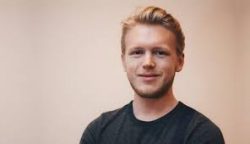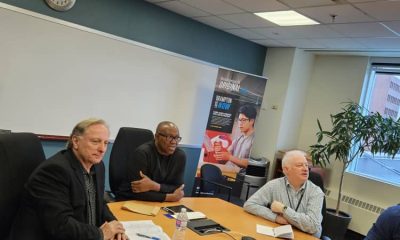News
Unbelievable! This 26-Year-Old earns N723m annually
Published
4 years agoon
By
Olu Emmanuel
…see how
Nat Eliason turned his philosophy degree into a money minting machine. This article is about how he did it and how you can, too.

Nat Eliason
After graduating from Carnegie Mellon Univ., Nat Eliason takes a marketing job at a list-topping remote tech company, Zapier.
He’s employed there for a few short months before he gets hired away by Noah Kagan to work at his marketing SaaS powerhouse company, AppSumo, in Austin, Texas.
Eliason soon realizes he doesn’t need to work at a company to be successful. He bets he could do better on his own. After ten months, he quits his job.
He raises $125,000 to start a company called Tailored Fit, a machine-learning apparel shopping website, and burns through it all because “we had no idea what we were doing.”
In pinnacle digital nomad form, Eliason travels the world writing in-depth articles on his personal blog, nateliason.com, on topics like travel, marketing, philosophy, technology, books, business, and psychology. Soon, his blog traffic grows to over 300,000 visitors a month. The traction to his personal website soon becomes a launching pad for various entrepreneurial ventures.
He creates a male kegel sex app called Stamena, which brings in $4,000-$7,000 in a strong month and $1,000-$3,000 in a weak month. “Revenue fluctuates month to month based on how highly the [SEO] articles are ranking,” he says.
He also publishes an online course called “Programming for Marketers” which netted $58,000 in its first 5 months. He has since shut it down and the course’s website, www.programmingformarketers.
In nearly all his blog articles, he embeds Amazon affiliate links, which produce another healthy stream of income.
Eliason even makes money from reading books. He does it by maintaining an index of highlights and quotes in Evernote from the hundreds of books he’s read and calls it his “Brain.” He sells access to it for $50. I’ve seriously considered buying it.
Together, these initiatives bring in roughly $12,000 per month, he tells me.
In September 2017, he moves to New York City and hits a rough patch. Stamena sales drop. “I just doubled my cost of living and halved my income. It wasn’t sustainable.”
This difficulty incepts Growth Machine, his SEO content marketing agency. For a while, several clients had been asking for his services, but he isn’t interested in, as Naval Ravikant puts it, renting out his time (a.k.a. freelancing).
However, due to the revenue crunch, he agrees to work with a handful of clients.
The years he had spent writing on his personal website suddenly pays off. His opening price for each client is $6,000 per month.
That number rises steadily.
Today, Growth Machine is doing $150,000 in monthly revenue. Eliason’s role scales into being more of a CEO; he focuses on business development and hiring employees. He’s writing less.
Altogether, Nat Eliason’s projects and businesses generate $1.94 million in total annual revenue.
Nat says he takes home about $16,000 a month personally. He turns 26 in March 2019.
In April 2019, his blog passes 690,000 visitors, according to the web traffic tool SimilarWeb.
Eliason’s latest venture is a brick-and-mortar tea cafe in Austin called Cup & Leaf. It’s scheduled to open its doors in mid to late 2019.
10 Life and Business Lessons From Nat Eliason
Don’t pursue freedom. All the usual goals and pleasures millennials strive for don’t seem to matter. He’s plumbed the achievement gamut — freedom, travel, intelligence, followers, money, sex — and yet has found them all to be …empty.
“It was immediately a wake-up call,” he writes after one year of digital nomadism. “My efforts up to that point had been focused on achieving freedom and pursuing novelty, but now that I had maximized them, I wasn’t any happier. Arguably I was less happy since I’d ditched plenty of amazing things (relationships, communities, cities) out of a sense that they limited my freedom.”
Pursue commitments. “It’s easy to get caught up in the pursuit of greener grass through more money, travel, sex, experiences, people, whatever you believe will bring you to that next level of bliss, but in most cases,” says Nat Eliason, “the grass is greener where you water it.” Take Cup & Leaf, for example. He’s well aware a local niche cafe is not the optimal way to generate revenue or increase freedom. “But it’s a cool experience,” he says. Another one of his commitments is called second-degree dinners, an innovative way to meet new people in your city.
Disregard fame. As someone whose accomplishments relative to his age could probably get him ranked on any number of “30 Under 30”-type lists, Eliason says: “Most of those lists are bullshit. I personally don’t care about them.” Nat doesn’t write for Forbes or Inc. or Entrepreneur because “They don’t have any backlink value,” he says. “Bylines don’t mean anything to me.
The stuff I write I want to be useful for years — adding it to the churn of these sites seems like a waste.” Plus, “I couldn’t make fun of them,” he smiles.
Put money in its proper place. “I don’t care about money,” he says. If money were his main goal, the fast lane for him he says would’ve been to get into private equity and invest a lump of cash in index funds and live off the earnings. But: “Anybody who does that while sipping Mai Tais on a beach in Thailand will not be happy,” he says. For Eliason, money buys the ability to do more of the things that motivate him. Work is a part of that. He works “because I care more about having smart people around me who enjoy working with me.
Avoid fakeness. Routines can be fake. Writing can be fake. Projects can be fake. You can do these things because someone told you you should or because you really want to. Be the latter. Don’t have a role model to copy. Aim for things, not people, he says. Be yourself and strive to be great at what you desire most.
Learn SEO. The two skills you need to do what Nat has done are writing and SEO.
Nat’s advice for SEO is to write the best answer on the internet for a question people type into Google (e.g., how to design a website). “It’s really hard,” he says. The hardest part of SEO is knowing how to write well says Nat. “A lot of people understand mechanics, not writing,” he says. Being a philosophy major first was a big help for knowing how to clearly explain complex ideas in readable language. For more, here’s his 1-Hour SEO course for free on YouTube.
The question “Where do you see yourself in 5–10 years?” is silly. “I have no idea,” he says. “I can’t accurately predict that far ahead.” Instead, he works with a timeline of 3–6 months to make plans and tries to maintain reasonable expectations as he works on them.
Saying “no” is terrible advice. “Say later instead of no,” says Nat. “I have an infinite list of possible later projects. I get to pick from those when I have time.”
Read for 30–60 minutes a day.
At the time of our interview, he was reading The Most Important Thing: Uncommon Sense for the Thoughtful Investor.
His favorite organization tool: Asana.
A final thought
Neil Gaiman, in his Keynote Address to the University of the Arts in 2012 entitled “Make Good Art” said a statement that embodies Nat Eliason:
“The old rules are crumbling and nobody knows what the new rules are. So make up your own rules.”
Original millionaires are made not by copying the path of another person or by following a formula, but by unifying your unique assets (skills, passion, and hard work) with the right path (opportunities and projects and people) — it’s very difficult to figure out—but if you can maximize it, you’ll create a significant amount of value that only you can create.
Trending

 Latest4 days ago
Latest4 days agoObi advocates productivity, leadership commitment as invaluable insights for nation’s growth, as in Brampton, Canada

 Crime5 days ago
Crime5 days agoFuel scarcity: Trigger-happy policeman fatally shoots man who try to stop him from jumping queue at a filling station

 Agribusiness7 days ago
Agribusiness7 days agoGMO crops will render Africa farmers more reliant on multinational corporations

 Business1 week ago
Business1 week agoNNPC says fuel queues to be cleared by Wednesday

 Business5 days ago
Business5 days agoCourt stops NERC from implementing tariff hike for Band A customers

 Agribusiness5 days ago
Agribusiness5 days agoRebuttal of claims on safety, benefits of GM crops

 Crime6 days ago
Crime6 days agoMandi, mastermind behind Abuja-Kaduna train attack arrested

 Business5 days ago
Business5 days agoLagos now Africa’s 7th largest economy as GDP soars to N41trn

